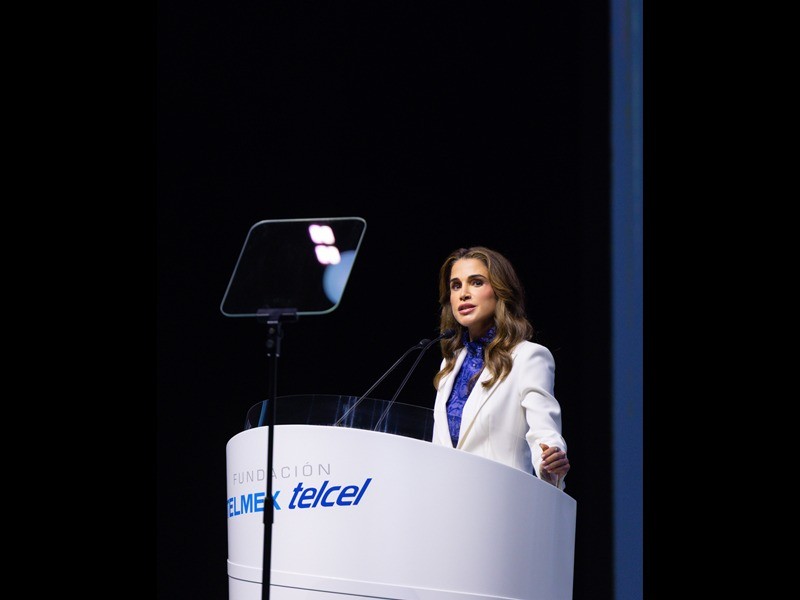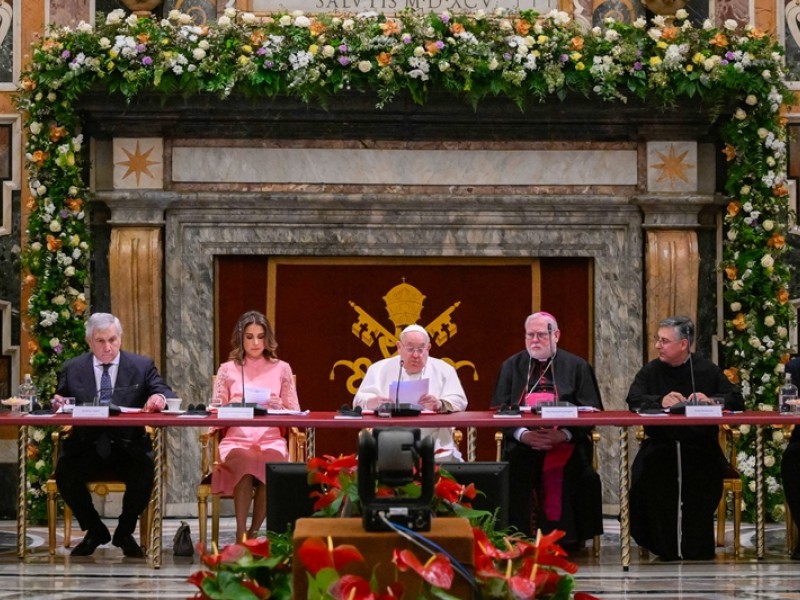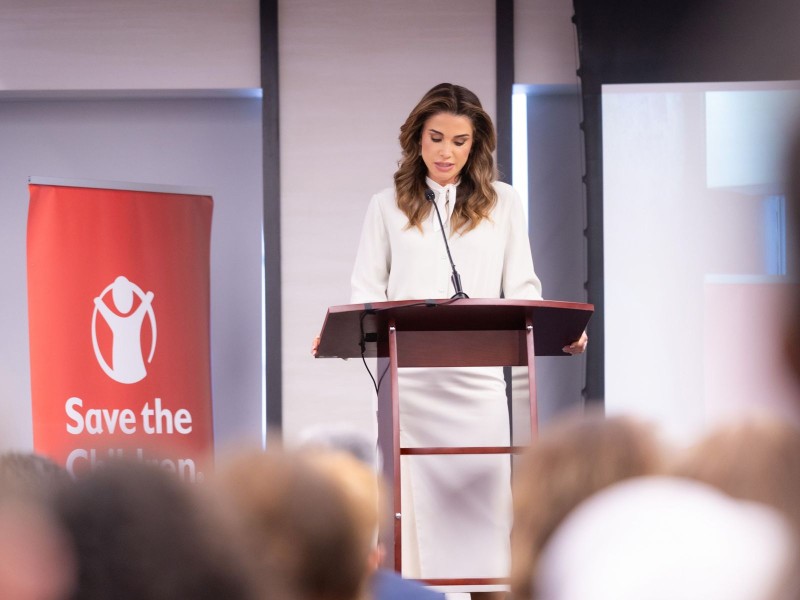Queen Rania's Speech at International Reading Association's Annual Convention - Chicago, USA
Thank you, Kathryn.
You know, if people were like books, I think you would be a page turner. Decorated and distinguished at every stage of your career – as a teacher, academic, advocate for literacy, and now IRA’s president –you have inspired people of all ages and abilities, especially those who don’t know the joy of writing their name…or reading the opening sentence in a novel.
As the IRA continues to spread the word about literacy, both in the US and around the world, your vision and leadership will be central to its success.
Around this time last year, I was in South Africa with the Global Campaign for Education, to promote literacy week. It was there I met another remarkable woman, a storyteller called Gcina Mphole
She told me a story her father had told her. It was the story of her aunt, an illiterate woman who, despite not understanding what words meant, knew that they were somehow important. So she collected anything with words on it - hymn books, bibles, labels, pages torn from newspapers, anything - and she put them in a suitcase.
Gcina’s aunt believed there was wisdom in those words, and that, one day, the voices of those people would speak to her.
Sadly, she never heard those voices. She died without ever learning to read or write.
But, on hearing that story, Gcina had what Oprah might call, an “Aha” moment. She wanted to find that suitcase and ‘wake it up.’
She wanted to rekindle the excitement in others of finding a suitcase of books and unlocking the wonder of words. She wanted to take books to schools in rural villages all over South Africa so that even the most impoverished children could learn to read and write.
And, so, today, in memory of her aunt, Gcina travels around her country telling stories to villagers, raising money to buy books for schools, and encouraging children to read.
Everywhere she goes, she leaves behind a suitcase of books because she believes literacy is luggage for life –the kind you want to carry around.
I agree…and I know all of you do too. So do the nearly 760 million illiterate men and women around the world.
Because being able to read and write is more than spelling your name or reading a road sign…
Literacy. Lifts. Lives.
Literacy fills in application forms; gets well-paid jobs, and can be a path out of poverty. Literacy accesses the internet; teaches hygiene, and wards off disease. Literacy empowers; makes people more confident, and more able to improve the lives of those around them.
And literacy enriches; it can help us appreciate other people and other cultures.
Because for all our shared progress, for all the technology narrowing the spaces between us, and for all the ease with which we can cross borders and time-zones, I worry that, today, our global community is fraught with cracks and, in some places, even chasms.
Much of that can be traced back, understandably, to the horror of 9/11 –a day which rocked humanity. An ugly day which distorted the relationship between the Muslim world and the West, for who knows how long?
In fact, one of the cruelest legacies of 9/11 is the suspicion we now carry in our hearts, the intolerance that now informs our decisions, and the mistrust we now feel when we see new faces and places.
And in an increasingly diverse and multi-cultural society, that’s a problem. For everyone.
I wonder what you really thought when you heard that an Arab and Muslim woman from the Middle East was talking to you today?!
“Will she be wearing black? (No) Will her head be covered? (No) Will we see her face?” (Certainly) “Do women in her country drive?” (Yes) “Does she hate America?!” (Not at all)
The list goes on. I’ve heard them all before. Some of them even make me laugh –like, “Can she work?” My office would enjoy that one!
But I sober up quickly when I realize that around the world, there are millions of people who don’t think those are punch-lines to a joke. And I feel downright depressed when I read surveys, like a recent Gallup poll, which found that:
More than 4 in 10 Americans (43%) admit to feeling at least "a little" prejudice towards Muslims.
Nearly one-third of Americans say their opinion of Islam is "not favorable at all".
Two thirds of Americans tell Gallup that they have either “very little knowledge” or “none at all” about Islam.
But guess what? Amongst those who actually knew a Muslim, opinions were much more favorable. Misconceptions melted away. It shouldn’t be a revelation – get to know someone before you judge them - but it is. It should be common sense, but it’s not.
It seems that while we’re making strides in combating illiteracy around the world, thanks to the efforts of people like you, when it comes to cross-cultural literacy, we’re all still stumbling over the a,b,c’s.
We’re struggling to grasp the language of diplomacy, dialogue, and discovery…and we’re losing the chance to turn the tragedy of 9/11 into a turning point for humanity.
And let me make it clear, I mean all of us: Arabs, Muslims, East, West, Americans, Europeans…everybody.
We all have a choice. We can turn away from the unfamiliar or we can tune in and learn more. We can let it harden our hearts or we can let it open us up to new truths.
I chose the latter. That’s why I wrote The Sandwich Swap.
The Sandwich Swap was inspired by my first brush with ‘something different’…a yucky looking peanut butter and jelly sandwich belonging to my friend. But I’m not going to tell you what happened next. You’ll have to read it!
What I will say, is that it only took that one encounter at such a young age for me to stop fearing and second guessing diversity.
After that, differences became part of the turf, adding color, texture, and a sense of wonder to the landscape. They became second nature, deeply ingrained in my identity and view of all that surrounded me.
I remember Sanguita, my Indian girlfriend, inviting me to her home and my fascination with the style, colors and fabrics in which her house was decorated. She showed me the different oils she used in her hair to keep it soft and shiny.
I remember a friend from Sudan who invited me to her sister's henna night, and how I marveled at the intricate patterns that were so carefully and artistically tattooed on her palms.
I remember accompanying my parents to their American friends' house for Thanksgiving dinner. To this day, stuffed turkey and all the trimmings remains one of my favorite meals!
My point is that, as literacy empowers us, cross-cultural literacy enriches us. Alfred Lord Tennyson summed it up when he said: “I am a part of all that I have met.”
And once you are a part of everyone you have met, you are more likely to understand them…empathize with them…not pre-judge them. You’re more likely to be friends with them.
Now, of course, it’s impossible to meet and get to know everybody, but we can reach out to people who we’ve perhaps shied away from in the past. You know who I’m talking about: the neighbor across the fence, the guy in the canteen, the mother who picks her child up at the same time as you…
If we think about it, we know we can all do more.
I’d especially like to see us doing more in classrooms. Did you know that between KG and year 12, our kids spend around 16,000 hours in school? That’s a formative force shaping our children’s lives.
And within schools, teachers have a very special part to play, especially in America, the world’s powerhouse. Because teachers here are fostering tomorrow’s global citizens…nurturing future leaders…influencing how tolerant, open-minded, and knowledgeable the next generation can be.
Just look at how Barack Obama’s teachers helped change US history, and improve the image of America abroad.
Who knows who sits in your classrooms today? The next Ghandi? The next Nelson Mandela? The next man or woman who will help us close the book on intolerance, and open a new chapter on understanding?
That’s why the world needs you to help break stereotypes… build bridges between the East and West… and help change Arabs’ and Americans’ perceptions of each other.
Whether it’s through the internet with kids in America having real time conversations with kids in the Arab world. Or meeting new characters from different cultures through the pages of books, we all have a responsibility to raise a respectful and knowledgeable generation of children.
Because the more we open our children’s minds, the more secure our future will be.
So, let’s take a page out of Gcina’s book.
Let’s strive to overcome cross-cultural illiteracy once and for all.
And let’s promise that, whatever our destination, when we open our suitcases, we’ll unpack compassion, forgiveness, knowledge, and respect…and begin a new journey together.
Thank you very much.
Featured
Queen Rania's official website
This website does not support old browsers. To view this website, Please upgrade your browser to IE 9 or greater
Your browser is out of date. It has known security flaws and may not display all features of this and other websites. Learn how to update your browser



